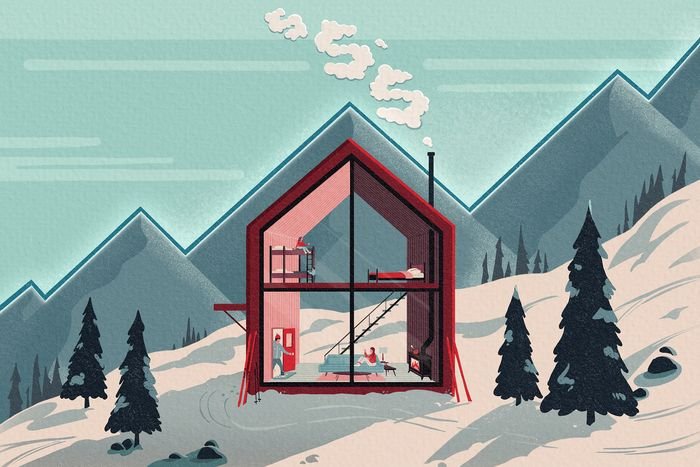
By Robyn A. Friedman
May 23, 2023
In the market for a vacation home? That beachfront estate in the Hamptons or ski-in, ski-out chalet in Aspen might seem like a dream come true. But plans change, so thinking of your vacation home as an investment can help ensure your dream doesn’t turn into a nightmare.

ILLUSTRATION: MIKE ELLIS
Consider John Foreman, a tech-company executive who unexpectedly became a landlord after building a five-bedroom, mountain-modern home in Black Mountain, N.C., about 20 minutes from Asheville. Foreman, 39, originally planned the residence for his wife and three sons, but a job offer took the family from Atlanta, a three-hour drive, to Utah, a four-hour flight, while it was under construction. So, after it was completed in 2020, he listed the property with Airbnb, renting it for $1,000 a night. The property brought in $250,000 in revenue in 2022, netting Foreman $80,000 after expenses. Still, despite the property’s success as a vacation rental, it is now listed for sale for $3.75 million.
“It’s a lot of work, and I’m already very busy,” he said. “Even though I have a property manager, there’s still stuff that I need to handle, like warranty issues with the builder because it’s new construction. It would be a lot easier to coordinate things if I lived closer.”
That is why real-estate professionals say that even if you plan to use a vacation home solely for personal use, it is essential to consider the home’s potential as an investment property in the future. A job loss or change in family status, for example, might require you to rent the property out for a few weeks a year to help defray costs, or convert it to full-time rental use.
When searching for a vacation home, location is the key consideration, as with all types of real estate. Think about what local amenities drew you to an area in the first place, and then make sure the property you’re interested in is close enough that you, or your future renters, will actually use them, whether that is beach, hiking trails, tennis courts or downtown areas for dining and shopping. Killer views are also one surefire way to make a house more attractive to renters.
Size matters as well. The more bedrooms, the more space for family and friends and the higher the asking price should you decide to rent it. The downside is that more renters can mean higher cleanup costs, and more potential for property damage. Also, even if you don’t initially intend to rent out your vacation home, be wary of condominium or homeowners association rules, or local government regulations, that might restrict the number of people in a rental home, or prohibit rentals entirely.
Accessibility is another key factor in choosing the perfect vacation home. Consider the proximity to your primary residence and how easy it is to get there, whether it is a short drive or a direct flight without the stress of making connections.
Even if you plan to use your vacation home solely for friends and family, if you live farther than an hour’s drive away, you’ll likely need a caretaker or manager to oversee the property and inspect it regularly for problems like water leaks, a broken furnace or water heater or other maintenance issues. Property management costs $200 a month and up for vacation homes on Cape Cod, Mass., that aren’t rented, which includes weekly visits to check on the house, not including any required work, according to Matthew Cole, president and chief executive officer of Cape Associates, a property management and custom-building firm based in Eastham, Mass. Foreman paid 25% of the gross rents generated by his vacation home to a management company, but prices vary by market.
Here are some other things to consider if you’re shopping for a vacation home.
Consult your tax adviser. If you plan to use the property for both personal and business use, limitations may apply to the rental expenses you can deduct for mortgage interest, real-estate taxes, maintenance, utilities, insurance, depreciation and other business costs. The rules can get complicated and vary greatly depending upon the extent of your personal use of the property.
Expect higher financing costs. If you plan to finance your vacation home, the interest rate might be higher than for a primary residence, and the lender may require a higher down payment. Fannie Mae and Freddie Mac have raised fees for second-home loans they purchase, according to Patti Lotane, a mortgage loan officer for Cape Cod 5 in Chatham, Mass. For example, the interest rate on a $500,000 mortgage for a primary home with 20% down was 6.375% with no points on May 15 if that loan was sold on the secondary market, while the rate on a similar loan on a second home was 8.125% plus half a point, she said.
Shop for insurance ahead of time. Will Van Den Heuvel, senior vice president, personal lines, for The Cincinnati Insurance Co., said that location affects both the cost and availability of homeowners insurance for a vacation home. A lake home in the middle of the country, for example, should be readily insurable. But in riskier parts of the country, such as California and Florida, insurance premiums are rising and options are shrinking. “We have seen some homes deemed uninsurable at any price,” Van Den Heuvel said. “That would obviously influence a purchasing decision.”
Dow Jones & Company, Inc.


